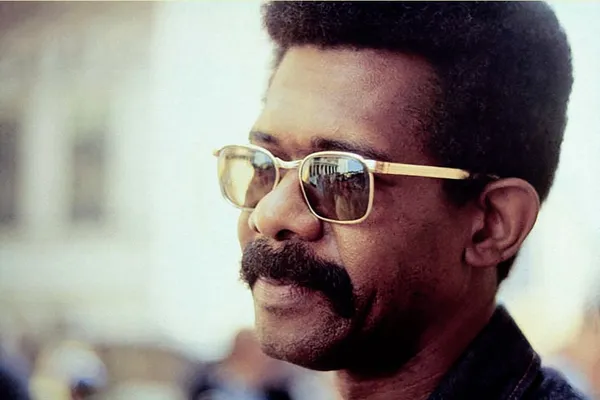The impressive list of the 2021 NAACP Image Awards includes double winners Viola Davis (George C Wolfe’s Ma Rainey's Black Bottom and Peter Nowalk and Shonda Rhimes’s How To Get Away With Murder) and Chadwick Boseman (Ma Rainey's Black Bottom and Spike Lee’s Da 5 Bloods), Dawn Porter’s John Lewis: Good Trouble (Documentary), Barack Obama’s A Promised Land (Nonfiction), Walter Mosley’s The Awkward Black Man (Fiction), Eddie Murphy (Hall of Fame Award), and Melissa Haizlip’s Mr. Soul! (Outstanding writing in a documentary, television or motion picture).
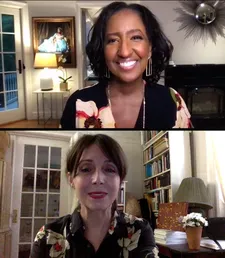 |
| Melissa Haizlip with Anne-Katrin Titze on Ellis Haizlip and Mr. Soul!: “We were always aware how big the story was, but we just zeroed in on the humanity of the story.” |
The BBC connection with Ellis Haizlip arranging the powerful Soul! conversation between James Baldwin and Nikki Giovanni, a Questlove podcast with Rick Rubin, original Soul! watcher and music producer Ed Bahlman (founder of 99 Records) on ESG and Earth, Wind & Fire, and the personal journey for Melissa Haizlip all came up in the first instalment of my conversation with the director, writer, and producer of Mr. Soul!
For 130 glorious episodes, between September 8, 1968 and March 7, 1973, Soul! explored every aspect of Black culture, bringing to a national audience, the latest and most ground-breaking talents in dance and poetry, music and performance and activism. The show on Public Television, which featured many women on the crew, was broadcast live with an audience and no seven second delays. When Ellis Haizlip or one of his guests 'messed up', the program became all the more human The impact of Soul! on the Nation with guests such as Harry Belafonte, Sidney Poitier, Muhammad Ali, Gladys Knight, Stevie Wonder, James Baldwin, Nikki Giovanni, Earth, Wind & Fire, Al Green, Ossie Davis, Ruby Dee, Sonia Sanchez, The Last Poets, Wilson Pickett, Toni Morrison, George Faison, Patti LaBelle, and Maya Angelou cannot be overestimated.
From New York, Melissa Haizlip joined me on Zoom for two in-depth conversations on Mr. Soul!
Anne-Katrin Titze: First of all congratulations on your NAACP Image Award!
Melissa Haizlip: Oh, It’s so exciting, it means so much to us. We were nominated for three and then we received the award for best writing and it just means so much, because this is a very special project and to receive that kind of recognition really just helps us understand the significance of what we’re doing and the significance of this type of show and this type of film. This is so rewarding because you work so hard for so long and you know that your story’s important. It takes an award to have that kind of recognition, which really brings more recognition to Ellis Haizlip and the Soul! show. We’re excited to be premiering on HBO Max this weekend, on August 1.
AKT: Yes! The program was of such vast cultural importance and for you it is also a family memoir. Were they ever in conflict? Did you ever feel that you had to balance the two, the gigantic impact and the personal?
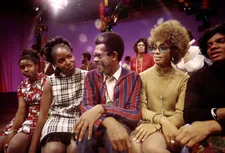 |
| Melissa Haizlip on Ellis Haizlip doing Soul!: “The perfect host and it’s such a nice symmetry because you get to see him as a sort of fish-out-of-water character and then you get to see him grow.” |
MH: That’s a very good question. Because Ellis Haizlip was my uncle and he started out as my babysitter. So of course I’m a little biased there. I had to find a way to pin my emotions and put them aside for a moment to try to tell a 360 fulsome story about this man that I only knew in one real capacity. Well two, because I got to work with him. But also the fact that he’s in my family, so I wanted to make sure that it was not a biased lens through which we were exploring him. But also as a family member having that access was completely unique.
To really understand who he was as a regular person, also to understand his ambition as somewhat of an unsung hero and a queer icon and a broadcast pioneer. So yes, we were always aware how big the story was, but we just zeroed in on the humanity of the story. And really the understanding of who was this man and how did he put his unique stamp on a show that would then impact the entire cultural landscape and the television landscape at that time.
AKT: Right. And still to think about it now - what television programs about poetry do you know?
MH: None!
AKT: It doesn’t exist.
MH: It doesn’t exist! I’m so glad you picked up on that because all we knew was the Beat poetry from the Sixties, that was more performative in style and just emerged from the coffee houses and the culture, but nowhere had there been this expression of Black creativity and love and strength and community and aspirations and you just hadn’t seen that in the poetic form. It really became the beginning of spoken word as almost a performative expression. And also a clear expression of the people and what they were feeling and thinking - very intimate and very powerful, very unique.
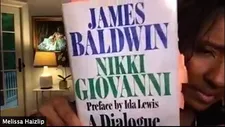 |
| James Baldwin Nikki Giovanni A Dialogue Photo: Melissa Haizlip |
And I think that Ellis Haizlip saw that as a modality of expression. It was important for him to convey that the poets of that time were really the griots of the culture, carrying forward the tradition. And expressing the hopes and dreams and fears and loves of a culture that hadn’t really had their voices heard. Bringing them out in front, and especially the women, was really groundbreaking.
AKT: Totally. How much TV lends itself to poetry, we forgot about.
MH: You’re absolutely right. Because we think poetry is on the page and our own personal reaction to it when we read. Seeing it performed that way was actually setting the stage for what came later on with Def Poetry Jam and all the poetry slams. It really set the tone for a new cultural wave
AKT: When David [Magdael, the film’s publicist and associate producer] sent me the notice about the upcoming release, my spouse, Ed Bahlman of 99 Records, he said “Oh, I remember watching that show!” I don’t know if you are familiar with ESG, the group?
MH: Yeah, of course!
AKT: He produced them.
MH: Oh wow!
AKT: Maybe you want to say hi?
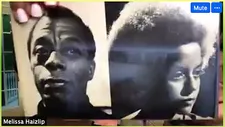 |
| James Baldwin Nikki Giovanni A Dialogue back cover Photo: Melissa Haizlip |
MH: Yeah, sure. HI!
Ed Bahlman: It’s wonderful, memories just flowed right through me watching your film.
MH: I’m sure, especially as you were in the life and championing for these artists that even now are barely getting their due. It’s such a love letter to the music.
EB: You also mentioned Midnight Special and Don Kirshner’s Rock Concert.
MH: Exactly. To contextualize how important that was [the Soul! programming].
EB: You did that so well. You gave so much context to the time period, the performances were great, the editing terrific. Earth, Wind & Fire taking the instruments out of their hands, just that little dance they did, I got so excited.
MH: The funny thing is, that was Questlove. Questlove is an avid fan of Soul! He has almost every episode it turns out. When I interviewed him, he was more encyclopaedic in terms of knowing all the details. And he was the one that told me that The Roots had modelled their sets sometimes after the way Earth, Wind & Fire had done and the way Soul! set up their sets.
Then he recounted that moment of them playing without playing. I had missed that moment. It’s like the gift that keeps on giving, because there’s so many little Easter eggs in this archive and i really wish it could be seen by so many more people. That’s exciting about the HBO Max, that it will have a national platform again. For those who missed it or who weren’t in the life like you were - I call it the greatest show you’ve never heard of.
 |
| Melissa Haizlip with Anne-Katrin Titze and Ed Bahlman |
EB: Right!
MH: Because this generation hasn’t. And they think that our cultural history started with Soul Train [in 1971].
EB: I put in a search for Questlove because of his film, and what came up was his podcast with Rick Rubin.
MH: Oh, yes!
EB: And Questlove is talking to Rick Rubin about ESG, “Oh, wow, you really saw ESG?” I discovered them at a Columbia Recording talent contest [where Ed was a judge].
MH: Oh gosh.
EB: And Liquid Liquid, too. All the controversy with White Lines.
MH: Of course, of course, oh my gosh. And I am a music head as well, total nerd, and also a musician, so, you know, I wanted to imbue a sense of musicality and there’s so much to include that you just didn’t want to leave anything out. It was really important to tell the story and sit it in the zeitgeist of what created the opportunity for Soul! to exist.
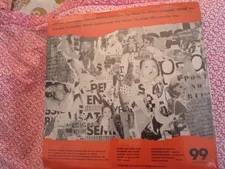 |
| come away with ESG LP, produced by Ed Bahlman at Radio City Music Hall Photo: Anne-Katrin Titze |
And in fact, Soul! could just bring visibility. Many people don’t think about that. I tried to explain that unless you were on the Chitlin’ Circuit, as they called it, or lucky enough to be booked at the Apollo, these acts, you heard them on the radio, and that’s it. You didn’t see them!
AKT: I love the way you start with the switch of TV to “In Color!”
MH: Yes, that was another thing, the colour. Television was going from black and white to colour. Television anyway was pretty monochromatic because there weren’t a lot of Black people on it, if any. So this moment, zeroing in on the fact that you had colour television, people of colour on television in a really unique moment that couldn’t have happened in any other way. The reason it’s so unique was that it’s also in tandem with the beginning of PBS getting a national audience for the first time and bringing West Coast and East Coast together, I think that makes it even more special.
EB: I just wanted to say hi. Good job! [Ed withdraws from Zoom]
MH: Nice to meet you!
AKT: The joys of Zoom, you never know if a cat or somebody comes by. The clips you chose from the interview between James Baldwin and Nikki Giovanni were so spectacular, that yesterday I watched the entire two hours.
MH: I know, isn’t it amazing!
AKT: It’s so fantastic, the two of them!
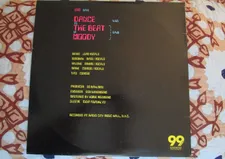 |
| ESG EP, produced by Ed Bahlman at Radio City Music Hall Photo: Anne-Katrin Titze |
MH: It’s literally the high-water mark for me and for many. Because there’s just a little clip that went viral on Instagram and social media a few years ago. People didn’t know what it was. They were just transfixed, like what is this conversation between these two icons? People on social media were not concerned that it came from Soul!, they were responding to their conversation as a man and a woman, Baldwin and Giovanni, as two literary icons, really taking in all the issues they were talking about, like they could be happening today.
Ellis was so forward-thinking that that was actually recorded in London at the BBC, because James Baldwin was living in the South of France, near Provence at the time. Saint-Paul-de-Vence, that’s where he was. He didn’t want to come back to America because he was so disgruntled and frustrated and discouraged by the racial relations and the tensions that were happening post civil rights, on the heels of civil rights, and after Martin Luther King was assassinated. So he wouldn’t come back to the United States, but he was a good friend of Ellis Haizlip, so he said why don’t we meet halfway?
So they met in London, which is not exactly halfway, but what a brilliant thing! Can you imagine? To pick up your New York Public Broadcasting team and say, let’s go to London to shoot James Baldwin? And then for Ellis Haizlip to have the foresight to say, I’m going to put Nikki Giovanni in the chair, a woman, a young upstart, whereas Ellis Haizlip could have done that interview all by himself. It was really generous that he did that and now we have that iconic conversation that was actually made into a book.
AKT: Oh!
MH: I have it right here, I want to show you. This is such a rare book, it’s worth about $4000 now. I got it for $400 about 12,14 years ago and I thought that was a lot of money then. The idea that the conversation was so significant that they would not only transcribe it and print it at a time when James Baldwin was doing conversations, like with Margaret Mead and other intellectuals. What is interesting too, is they cleaned it up a bit, with an idea of being mindful that it is now considered literature. It’s nice to compare the two.
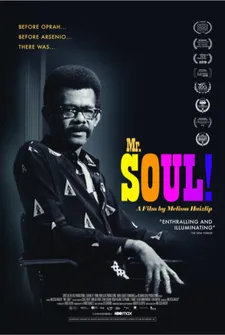 |
| Mr. Soul! streams on HBO Max from August 1 |
AKT: Yes, how they cleaned it up, what changes were made. The smoking, lighting one cigarette after another is gone, of course.
MH: And the hands and the drinking. It’s really just one of the most magical things I’ve ever seen. The hardest part was - we could have made a whole movie out of that.
AKT: You made a great decision. The first part is, I think from about 20 minutes in. The second part where Baldwin says “We don’t yet exist in the imagination of this century” and Nikki Giovanni’s face at that moment!!
MH: Her face!
AKT: It’s so brilliant, you chose exactly the right clip.
MH: You can see her literally absorbing what he’s saying and trying to reckon with it. You see it happening in her face. I’m so glad you pointed that out. For me it’s one of the most heartbreakingly beautiful moments. Because she’s registering what he’s saying about the fact that there might not be a place for her as a writer, a future for her, an acknowledgement of her, all of these things. It’s really really remarkable.
AKT: The “not yet”, you don’t yet exist as a poet!
MH: Mind-blowing!
AKT: You mentioned listening. Somebody says that Ellis was not only a “gardener”, which I also loved as a description of what he was doing with the show, but also that it was his quality as a listener, which made him stuck in the presenter role, whereas your father was not to be the host. A few had to leave before Ellis, the listener, the gardener, turned out to be the perfect host.
MH: The perfect host and it’s such a nice symmetry because you get to see him as a sort of fish-out-of-water character and then you get to see him grow. I would love to talk to you again so we can finish our interview. Is there any chance I could speak to you in 45 minutes?
AKT: Yes, see you then for part 2!
MH: You’re so kind, I appreciate it, be right back!
Coming up - Melissa Haizlip on Ellis Haizlip’s friendship with Audre Lorde, twinning together, the Nixon tape, archiving, Toni Morrison, Somewhere Over the Rainbow, house photographer Chester Higgins, Questlove watching the audience for style, Soul!’s hairdresser Diane and her “meticulous afros”, feeling welcome, Blair Underwood as the voice of Ellis Haizlip, giving agency, the interiority of Blackness, the preposition in Melissa’s production company Shoes in the Bed, and the lost Soul! shows.
Mr. Soul! streams on HBO Max from Sunday, August 1.








